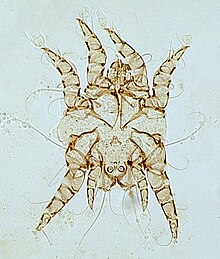| Otodectes | |
|---|---|

| |
| Otodectes ear mite | |
|
Scientific classification
| |
| Domain: | Eukaryota |
| Kingdom: | Animalia |
| Phylum: | Arthropoda |
| Subphylum: | Chelicerata |
| Class: | Arachnida |
| Order: | Sarcoptiformes |
| Family: | Psoroptidae |
| Genus: | Otodectes |
| Species: | O. cynotis
|
| Binomial name | |
| Otodectes cynotis Hering, 1838
| |
Otodectes is a genus of parasitic mite in the superfamily Psoroptidae (the biting cohort of the Sarcoptiformes order of mites). There is a single species of mite in this genus, Otodectes cynotis. [1] This mite is within the class Arachnida and subclass Acari for mites and ticks. Otodectes are external parasites (ectoparasites) of dogs, cats and ferrets, [2] but can be found on many other mammals. [3] Otodectes is found worldwide. [4]
The mite is 0.4 mm (0.016 in) in size, [2] approximately the size of a grain of salt, and can be seen with the naked eye. [5] It lives in the external ear canal of its host, and causes intense irritation leading to otitis externa. [2]
The lifecycle of O. cynotis takes approximately three weeks. [1]
Otodectes cynotis is typically spread by direct contact with infected species and does not have evidence of living in the environment for transmission. [6]
Etymology
New Latin Otodectes is from Greek prefix "ωτο- (ōto-)" meaning "ear" and the Greek word "δήκτης (dēktēs)" meaning "beggar." [7]
References
- ^ a b Taylor, M.A.; Coop, R.L.; Wall, R.L. (2016). Veterinary parasitology (4th ed.). Wiley Blackwell. pp. 224–225. ISBN 978-0-470-67162-7.
- ^ a b c Hendrix, Charles M.; Robinson, Ed (2012). "Otodectes cynotis (Ear mites)". Diagnostic Parasitology for Veterinary Technicians (4th ed.). Elsevier Mosby. p. 240. ISBN 9780323291255.
- ^ "VetFolio". www.vetfolio.com. Retrieved 2021-01-17.
- ^ Bowman, Dwight D.; Hendrix, Charles M.; Lindsay, David S.; Barr, Stephen C. (2002). "Otodectes cynotis". Feline Clinical Parasitology. Hoboken: John Wiley & Sons. pp. 389–390. ISBN 9780470376591.
- ^ Bassert, Joanna M.; Beal, Angela D.; Samples, Oreta M. (2018). "Otodectes cynotis". McCurnin's Clinical Textbook for Veterinary Technicians (9th ed.). Elsevier. p. 428. ISBN 9780323496407.
- ^ Lefkaditis, M. A.; Koukeri, S. E.; Mihalca, A. D. (2009-08-26). "Prevalence and intensity of Otodectes cynotis in kittens from Thessaloniki area, Greece". Veterinary Parasitology. Special Section: EVPC 2008: Veterinary parasitology and climate change. 163 (4): 374–375. doi: 10.1016/j.vetpar.2009.04.027. ISSN 0304-4017. PMID 19520513.
- ^ "Otodectes cynotis | American Association of Veterinary Parasitologists". www.aavp.org. Retrieved 2021-01-17.
| Otodectes | |
|---|---|

| |
| Otodectes ear mite | |
|
Scientific classification
| |
| Domain: | Eukaryota |
| Kingdom: | Animalia |
| Phylum: | Arthropoda |
| Subphylum: | Chelicerata |
| Class: | Arachnida |
| Order: | Sarcoptiformes |
| Family: | Psoroptidae |
| Genus: | Otodectes |
| Species: | O. cynotis
|
| Binomial name | |
| Otodectes cynotis Hering, 1838
| |
Otodectes is a genus of parasitic mite in the superfamily Psoroptidae (the biting cohort of the Sarcoptiformes order of mites). There is a single species of mite in this genus, Otodectes cynotis. [1] This mite is within the class Arachnida and subclass Acari for mites and ticks. Otodectes are external parasites (ectoparasites) of dogs, cats and ferrets, [2] but can be found on many other mammals. [3] Otodectes is found worldwide. [4]
The mite is 0.4 mm (0.016 in) in size, [2] approximately the size of a grain of salt, and can be seen with the naked eye. [5] It lives in the external ear canal of its host, and causes intense irritation leading to otitis externa. [2]
The lifecycle of O. cynotis takes approximately three weeks. [1]
Otodectes cynotis is typically spread by direct contact with infected species and does not have evidence of living in the environment for transmission. [6]
Etymology
New Latin Otodectes is from Greek prefix "ωτο- (ōto-)" meaning "ear" and the Greek word "δήκτης (dēktēs)" meaning "beggar." [7]
References
- ^ a b Taylor, M.A.; Coop, R.L.; Wall, R.L. (2016). Veterinary parasitology (4th ed.). Wiley Blackwell. pp. 224–225. ISBN 978-0-470-67162-7.
- ^ a b c Hendrix, Charles M.; Robinson, Ed (2012). "Otodectes cynotis (Ear mites)". Diagnostic Parasitology for Veterinary Technicians (4th ed.). Elsevier Mosby. p. 240. ISBN 9780323291255.
- ^ "VetFolio". www.vetfolio.com. Retrieved 2021-01-17.
- ^ Bowman, Dwight D.; Hendrix, Charles M.; Lindsay, David S.; Barr, Stephen C. (2002). "Otodectes cynotis". Feline Clinical Parasitology. Hoboken: John Wiley & Sons. pp. 389–390. ISBN 9780470376591.
- ^ Bassert, Joanna M.; Beal, Angela D.; Samples, Oreta M. (2018). "Otodectes cynotis". McCurnin's Clinical Textbook for Veterinary Technicians (9th ed.). Elsevier. p. 428. ISBN 9780323496407.
- ^ Lefkaditis, M. A.; Koukeri, S. E.; Mihalca, A. D. (2009-08-26). "Prevalence and intensity of Otodectes cynotis in kittens from Thessaloniki area, Greece". Veterinary Parasitology. Special Section: EVPC 2008: Veterinary parasitology and climate change. 163 (4): 374–375. doi: 10.1016/j.vetpar.2009.04.027. ISSN 0304-4017. PMID 19520513.
- ^ "Otodectes cynotis | American Association of Veterinary Parasitologists". www.aavp.org. Retrieved 2021-01-17.